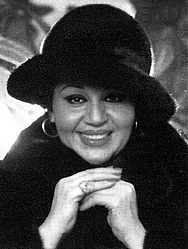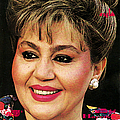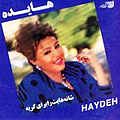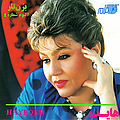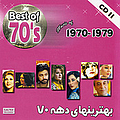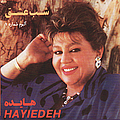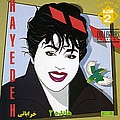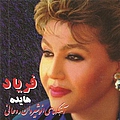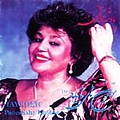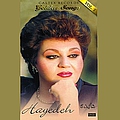Hayedeh Biography
Hayedeh (Persian: هایده) or Ma'soumeh Dadehbala (Persian: معصومه دده بالا), (April 10, 1942, Tehran, Iran – January 20, 1990, San Francisco) was a Persian classical and Pop singer with a contralto vocal range. In a career spanning more than 20 years, she had many hits. More than two decades after her death, Hayedeh is considered one of the most influential and iconic Persian vocalists recognized as one of the most popular 20th century singers. Hayedeh was born in Tehran. She is the older sister of another famous Persian singer, Mahasti. Hayedeh's professional career began in 1968 at the age of twenty six as a singer on a Persian traditional music Tehran Radio program called "Golhaa-yeh Rangarang" (Colorful Flowers)( گلهای رنگارنگ) directed by Davoud Pirnia. Hayedeh studied Avaz (Persian vocal music) with the famous Persian violinist and composer Ali Tajvidi. Hayedeh performed her first hit song "Azadeh" which was composed by Tajvidi on the lyrics of Rahi Mo'ayeri. Performing this work with Golha Orchestra in 1968 at Radio Tehran introduced Hayedeh's vocal talent to Persians who warmly received it. "Azadeh" which was composed by music by Ali Tajvidi, and was written by Rahi Moayeri was Hayedeh's first official hit. It was first performed in 1968 on Radio Tehran with the Gol-ha Orchestra and was later released by Ahang-e Rooz Records. In the 1970s Hayedah added Persian pop music to her Persian classical repertoire. In this period Hayedeh worked with several songwriters, such as Fereydoun Khoshnoud, Jahanbakhsh Pazouki, Anoushiravan Rohani and Mohamad Heydari. "Bezan Tar", "Gole Sang", "Norooz Amad", "Eyde To, Eyde Man" and "Soghati" were among her memorable works during this period. On August 29, 1978 shortly before the Iranian Revolution, Hayedeh emigrated to the United Kingdom. She stayed there for three years and moved to the United States in 1982 to continue her career and live close to her sister Mahasti. Hayedeh lived in Los Angeles from 1982 until the end of her life. The growth of the Persian community in Southern California due to the increasing number of people leaving Iran after the revolution bolstered Hayedeh's career in the 1980s. Heyedeh released many successful albums during this time and many songs of her were bootlegged in Iran as well. Hayedeh's political and nostalgic songs such as "Roozaye Roshan Khodahafez" and "Faryad" became very popular with the Persian (Iranian) exile community. Some of her other hits were "Shabeh Eshgh", "Gol Vajeh", "Ravi", "Bahaneh", "Eshareh", "Ghesseye Man", "Zendegi" and "Nargeseh Shirazi". Hayedeh's songwriters in the US were mostly Farid Zoland, Sadegh Nojouki, Mohammad Heydari and Andranik. Lyricists she worked with were Ardalan Sarfaraz, Homa Mir-Afshar, Iraj Razmjou but the lyricist who wrote most of Hayedeh's songs and hits was her best friend Leila Kasra (a.k.a. Hadieh). She was featured in two of her albums reading her songs. Kasra died in 1989 a few months prior to Hayedeh's death, after a long struggle with breast cancer. During the 80's Hayedeh played sold-out venues in the US, Canada, Europe, and other places in the world. Hayedeh regularly appeared on the Los Angeles Persian TV channels such as Jaam-E-Jam TV and IR TV. In some of her TV programs. Hayedeh criticized Iran's fundamental regime and was a supporter of monarchy. Hayedeh married and divorced three times and had three children named Kamran, Keyvan and Noushin Nouri, all of whom live in the US. Her eldest grandson "Soheil", who is the first born son of Keyvan Nouri, is currently pursuing a career as a freelance composer in Los Angeles. The public fascination with Hayedeh's personal life, as is true for all great performers, attracted a great deal of scrutiny of her private affairs. However, as is customary, most of Haydeh's so-called trivia were based on rumors. On the afternoon of Saturday January 20, 1990, the day after her concert at the Casablanca Club in San Francisco, California, Hayedeh died from a heart attack at the age of 47. Hayedeh had complained of discomfort since the morning but her doctor in Los Angeles had assured her that it was nothing serious. Hayedeh had a history of heart problem, diabetes and hypertension. She also had a history of alcohol and drug abuse, and was a smoker which led to her poor health shortly before her death. Her father was also a diabetic who died from a heart attack. Her two older brothers died of heart attacks, as well. She also dealt with depression after being exiled from Iran up until her death. Hayedeh's death shocked and saddened Persians around the world. On January 24, 1990, Hayedeh was buried at the Westwood Village Memorial Park Cemetery in Los Angeles, California. Her funeral was attended by thousands and most of the Persian singers and entertainers in exile. Khosrow Motarjemi, a Persian IT expert in California, recorded a video of this three and a half hour concert, which for unknown reasons has never been officially released. That night Hayedeh told the audience: "Life is like an express train...I am going to the House of God. Who knows what will happen in the future; I may not be alive tomorrow...", then she performed one of her last songs, "Shabe Meykhooneh" (Man Mikham Be Khoune ye Khoda Beram) (I want to go to the House of God). The song’s lyricist, Leila Kasra (Hedieh) who was Hayedeh's best friend, died of cancer a few months before Hayedeh. Hayedeh was recording an album shortly before her death and was due to finish recording it after she returned from her concert in San Francisco. Hayedeh was last interviewed one week before her death. The magazine which had the interview was released a day after her death, the issue became a bestseller. In the interview Hayedeh said that she was tired of rumors about her and said that she was going to continue her work and expand it even more. Hayedeh's albums are ageless masterpieces and are still best sellers. Her songs are constantly played on Persian TV and radio channels. Many covers of her songs are sung by famous Persian pop singers. According to Prof. Erik Nakhjavani in Encyclopædia Iranica: "Analogues to Delkash, before her, Hayedeh sang with technical authority and passionate energy. Her laryngeal control made it possible for her to produce a series of graceful vibrato and glissando vocalizations required by the Avaz Persian vocal music. She could smoothly pass from the upper reaches of her alto voice to the lower, fuller, and darker range of the contralto. This mixture of strong laryngeal strength and learned vocal technique gave her alto-contralto voice a rare, powerful resonance and texture in the performance of the Avaz. Furthermore an acute sense for musical timing, the rhythmic flow of vocal music, affective musical phrasing, and poetic delivery enabled her to express and interpret effectively any songs she sang." معصومه دده بالا با نام هنری هایده (۲۱ فروردین ۱۳۲۱ - ۳۰ دی ۱۳۶۸) خواننده ایرانی با صدای کنترآلتو است که بیست و یک سال در زمینه موسیقی دستگاهی و موسیقی پاپ ایرانی فعالیت داشت. هایده در تهران متولد شد. نام اصلی او معصومه دده بالا بود. خواهر کوچکتر او - مهستی - نیز از خوانندگان معروف ایرانی است که حدود سه سال پیش از هایده خوانندگی را آغاز کرد. هایده در ۱۳۴۷، فعالیت حرفهای خود را با خواندن ترانه «آزاده» اثر استادش علی تجویدی که بر روی آخرین سروده رهی معیری ساخته شده بود آغاز کرد. اجرای ترانه «آزاده» با ارکستر بزرگ گلها در رادیو تهران آغاز کار هایده بود. وی پس از اجرای چندین اثر دیگر از تجویدی و دیگر آهنگسازان در برنامه گلها، از نخستین سالهای دهه ۱۳۵۰ به خواندن ترانههای پاپ علاقهمند شد که بیشتر از ساختههای فریدون خشنود، جهانبخش پازوکی، محمد حیدری و انوشیروان روحانی بودند. هایده در شهریور ۱۳۵۷ چندین ماه پیش از پیروزی انقلاب ایران را به مقصد بریتانیا ترک کرد. او تا پایان عمر از این رویداد به عنوان تلخترین خاطره زندگی خود یاد میکرد. هایده از ۱۳۶۱ در لس آنجلس به فعالیت ادامه داد. آلبومها در دهههای ۱۳۴۰ و ۱۳۵۰ آثار هایده در ایران به صورت صفحه گرامافون و نوار کاست منتشر شد. بیشتر این آثار و همچنین کارهایی که هایده در دهه ۱۹۸۰ در آمریکا خواند، در دهه ۱۹۹۰ و همچنین ۲۰۰۰ از نو روی سیدی منتشر شدند. قرار دادن ترانهها در سیدیها اغلب از نظم ویژهای پیروی نمیکند. دو آلبوم پایانی هایده «ای زندگی سلام» و «سوگند» رسما به شکل آلبوم روی نوار و سیدی منتشر شدهاند. نام سیدیهای منتشر شدهٔ دیگر از هایده که بیشتر نام یکی از ترانههای سیدی را بر خود دارند عبارتند از: روزای روشن خراباتی پادشه خوبان خداحافظ شب عشق فریاد گلواژه آزاده بزن تار رفتم شانههایت را برای گریه آشنایی بلبلی که خاموش شد ناشنیدهها اومدنت محاله دشتستانی بزم نوروز ۱۳۶۴ سه سی.دی نیز از ترانههای هایده همراه با معین، ویگن و مهستی به نامهای «گلهای غربت»، «همخونه» و «اوج صدا» منتشر شدهاست. کنسرتها هایده به جز برنامههای معمول خود در کشورهای گوناگون، در دانشگاه یوسیالای در کالیفرنیا، و در تالارهایی با شهرت جهانی مانند رویال آلبرت هال (به رهبری فرنوش بهزاد) در لندن و موزیک هاله (هامبورگ) کنسرتهایی اجرا کرد. بیشتر ترانههای هایده در سالهای پیش از انقلاب در تلویزیون ملی ایران و پس از انقلاب در تلویزیون جامجم در لس آنجلس و بخشی دیگر نیز در تلویزیون ایرانیان و تلویزیون جنبش ملی ایران در جنوب کالیفرنیا به صورت نماهنگ (موزیک-ویدئو) در آمد. مرگ هایده در روز ۲۰ ژانویه ۱۹۹۰ برابر با ۳۰ دی ماه ۱۳۶۸ فردای اجرای کنسرت در باشگاه کازابلانکا در حومه سان فرانسیسکو، بر اثر سکته قلبی درگذشت. پیکر او در گورستان وست وود در لوس آنجلس با حضور هزاران نفر از ایرانیان مقیم آمریکا به خاک سپرده شد. هما سرشار (روزنامهنگار)، ویگن (خواننده) و حسن شهباز (مترجم و سردبیر فصلنامه رهاورد) از جمله سخنرانان در مراسم بودند. ویدئوی مراسم به فاصله کوتاهی، مخفیانه در ایران پخش شد. مستند پژمان اکبرزاده فیلم مستندی درباره فعالیتهای هنری و آثار هایده ساخته که در ژانویه ۲۰۰۹ برای نخستین بار در آمستردام اکران شد. این مستند یکصد دقیقهای با عنوان «سخن از هایده» دربرگیرنده بررسی فعالیتهای هایده، گزیدهای از اجراهای او در سبکهای گوناگون و گفتگو با دوستان و همکاران نزدیک اوست. مستند در جشنواره فیلم نور در لوس آنجلس نامزد دریافت جایزه بهترین مستند شد اما به گزارش تلویزیون فارسی بیبیسی، «برخی از بستگان و دوستداران هایده به دلیل بازگویی بی پرده برخی مسایل به آن اعتراض کردند»؛ از سویی در تهران، مستندساز از سوی خبرگزاری فارس به دلیل ساخت فیلم درباره «خواننده معلوم الحال طاغوتی» مورد انتقاد قرار گرفت. مستند «سخن از هایده» بیستم ژانویه ۲۰۱۰ در بیستمین سالگرد درگذشت هایده، توسط شبکه ایرانیان هلند منتشر شد و نسخه کوتاه شدهٔ آن نیز از شبکه فارسی تلویزیون صدای آمریکا پخش شد. در ژوئن ۲۰۱۰، کمی پیش از نمایش فیلم در جشنواره ایرانیان سیاتل، «روز آنلاین» در نقدی، مستند را «تلنگری برای یادآوری فضای شوم دهه شصت» خواند.
Top Hayedeh Lyrics
| Title | |
|---|---|
| 1 | Masti lyrics |
| 2 | Vasat mimordam lyrics |
| 3 | Zendegi lyrics |
| 4 | Gole sangam lyrics |
| 5 | Vay behalesh lyrics |
| 6 | Ya rab lyrics |
| 7 | Shabe eshgh lyrics |
| 8 | Delam khast lyrics |
| 9 | Bahooneh lyrics |
| 10 | Bezan Tar lyrics |
Write a comment
What do you think about Hayedeh? Let us know in the comments below!
